Explore the dynamic world of Open Educational Resources and discover how OER Africa is driving the movement forward. This page is divided into two sections:
Articles: Our articles aim to deliver insights on OER-related themes that inform, spark conversation, and engage with the developing open education landscape, with a particular focus on Africa.
Updates: Below, the articles, you'll find updates on OER Africa’s latest initiatives, activities, and contributions to the OER community.
Articles
This section features targeted articles crafted specifically for educators, students, and the global Open Educational Resources (OER) community. The articles examine themes related to OER, offering insightful perspectives and information. The content seeks to inform, prompt discussion, and actively engage with the dynamic landscape of open education, particularly within the African context.

Following adoption of the UNESCO Open Educational Resources (OER) Recommmendation, UNESCO launched the Dynamic Coalition for the OER Recommendation on 2 March 2020
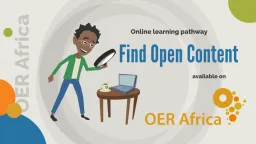
While many educators appreciate the value of openly licensed content, the issue is how to find these resources. OER Africa has prepared an interactive, multimedia rich, learning pathway on just this topic. It identifies a suggested simple set of procedures to find open resources that align with your curriculum requirements.
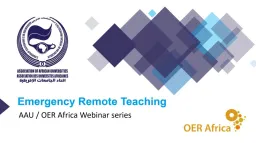
Trying to work out how to best teach your students during university shutdowns due to the COVID-19 crisis? Sign up for a webinar series on Emergency Remote Teaching, hosted by the Association of African Universities (AAU) and OER Africa. Register here.

World Book and Copyright Day on 23 April is a celebration to promote the enjoyment of books and reading. Now that so many of us are at home with our children because of COVID-19, we can explore the virtual world of children’s stories – all free to read and many openly licensed. Some wonderful book and reading resources are listed below.

This week, OER Africa shares some resources we consider useful for institutions in the midst of current restrictions of movement and the requirements to introduce remote teaching in many countries due to the COVID-19 pandemic. We have selected resources for universities, school management teams, mathematics, reading and writing, as well as our most popular downloads over the past six months.
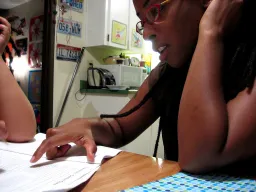
As the COVID-19 pandemic has spread, millions of learners and educational institutions globally have had to make rapid, unforeseen changes to how they run their learning programmes. Face-to-face teaching and learning have become impossible in many countries and there is uncertainty over when educational institutions will reopen their doors. This may have long-term effects on school programmes, examinations, and most importantly, learning.
Updates
This section provides updates on OER Africa’s initiatives and activities. Stay informed about our contributions to the OER community and how we are driving the open education movement forward.
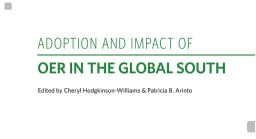
This volume examines aspects of educator and student adoption of OER and engagement in Open Educational Practices (OEP) in secondary and tertiary education as well as teacher professional development in 21 countries in South America, Sub-Saharan Africa and South and Southeast Asia.
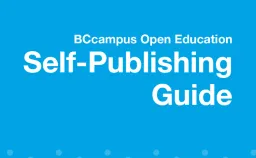
The BCcampus Open Education Self-Publishing Guide is a reference for individuals or groups wanting to write and self-publish an open textbook. This guide provides details on the preparation, planning, writing, publication, and maintenance of an open textbook. This looks like a very useful resource for the OER Africa partners.
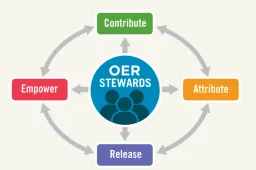
An important new resource has just been timeously released during Open Education Week. The question of “what makes a good actor or not” in OER is one that Lisa Petrides, founder and CEO of the Institute for the Study of Knowledge Management in Education, has addressed in a new guide for OER stewardship.

Ten Year's since the Cape Town Declaration, Melissa Hagemann of the Open Society Foundation reflects on OER developments.
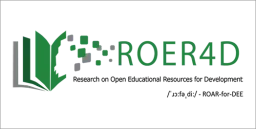
The ROER4D project being managed through the University of Cape Town is releasing chapters from their forthcoming online publication. In this chapter the authors report on an investigation into the production and rollout of four MOOCs at UCT in South Africa, and on the experiences of the educators involved in their production.
